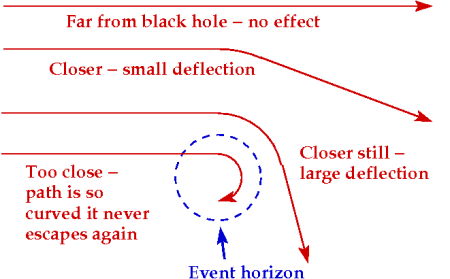 I was joking on Twitter yesterday that I have four major goals for my summer Astronomy 101 class. By the end of the course, they should know that
I was joking on Twitter yesterday that I have four major goals for my summer Astronomy 101 class. By the end of the course, they should know that
- astrology is pure bunkum
- the universe is big and old, and we don’t occupy a special place in it
- black holes don’t suck things in
- “Uranus” is not pronounced “your anus”
(With regards to 4, put the accent on the first syllable and use a short rather than a long “a”. If you really want to be a geek about it, pronounce it in the correct Greek manner as “OOrahnes”, with a secondary stress on the third syllable.)
As far as item 3 goes, there’s definitely room for a Physics Quanta post on how gravity affects light; for a brief explanation, listen to my podcast for 365 Days of Astronomy. To summarize even more: Einstein’s general theory of relativity shows that a massive object will change the path of light, in a similar way that it changes the path of another massive object like a planet. Light has no mass and obviously moves very fast, so the effect of gravity is much smaller on photons than it is on massive objects — light will never orbit our Sun, for example. However, the more massive an object is and the more compact it is, the stronger its gravitational effects will be.

A black hole is as compact as you can get: all the mass of a black hole is packed into a single point called the singularity. The effective size of a black hole is its event horizon — a spherical boundary around the singularity that separates the universe into two regions. Outside the event horizon, paths of light are curved by the black hole’s gravity, but the light can continue on its merry way; inside the event horizon, light paths are so curved that they will never uncoil enough to leave “interior” again. (Note for sophisticated readers: I am describing a classical non-rotating Schwarzschild black hole. Obviously, I’m also ignoring quantum effects because there is no quantum theory of gravity yet.) So no sucking is involved! As with anything else, the farther away you get from a black hole, the weaker its influence will be.
Black holes are resurgent in science news in the last few weeks, since the Chandra X-ray observatory discovered a plethora of high-mass black holes that formed in the early universe. Scientists have known for some time that the evolution of galaxies is linked to the massive black holes found at their hearts, but a lot of mysteries are left to be solved about how this link works. Suffice it to say that we’ll be hearing a lot more about black holes over time. But one thing they don’t do, in either the literal or the figurative sense: they don’t suck.
(The title is hardly original, I know. Summer Ash on Twitter informed me as I was writing this post that she gives talks with the same title. However, it’s not stealing, because we’re all scientists — we share data!)

4 responses to “Black Holes Don’t Suck”
[…] are difficult to observe, so the evidence for their existence is by necessity indirect. After all, a black hole is an object whose gravitational influence is so strong that anything coming too close cannot escape. From an observational point of view, we don’t […]
[…] pictures of Uranus, which include its elusive ring system. (For those who snigger at such things, here’s a reminder of how the planet’s name is pronounced (hint: not “your […]
[…] show at my old job), I’ve never given a public talk specifically about them. However, I love black holes. Did I mention I’ve written about them […]
[…] I’ve used that joke before. So sue […]